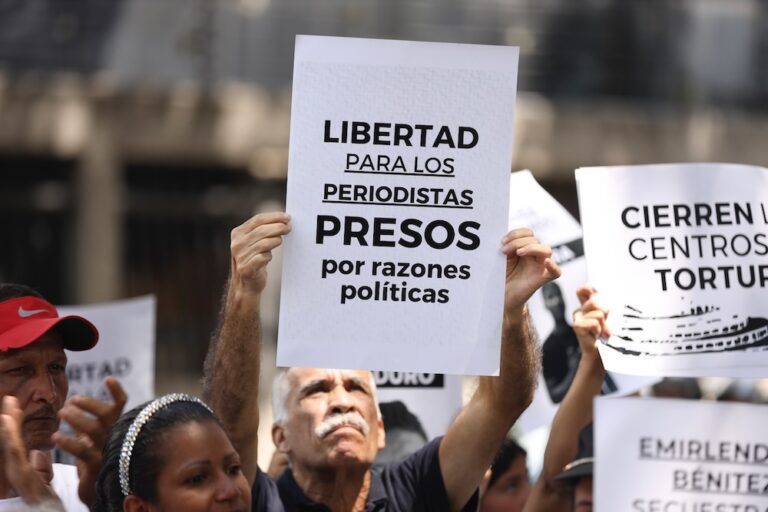(WAN/IFEX) – The following is a 4 June 2007 WAN press release: Golden Pen of Freedom Awarded to Jailed Chinese Journalist Cape Town, South Africa, 4 June 2007 – A Chinese journalist serving a 10-year prison sentence for revealing his government’s orders to newspapers to censor their reporting of the Tiananmen Square massacre anniversary, has […]
(WAN/IFEX) – The following is a 4 June 2007 WAN press release:
Golden Pen of Freedom Awarded to Jailed Chinese Journalist
Cape Town, South Africa, 4 June 2007 – A Chinese journalist serving a 10-year prison sentence for revealing his government’s orders to newspapers to censor their reporting of the Tiananmen Square massacre anniversary, has been awarded the 2007 Golden Pen of Freedom, the annual press freedom prize from the World Association of Newspapers.
The award to Shi Tao, who was imprisoned after the American search engine company Yahoo provided information to the Chinese authorities that led to his arrest, was made today, 4 June, the 18th anniversary of the massacre.
“Even today, most Chinese know nothing about what happened that day. The Communist regime continues to prevent the Chinese media from talking and writing about it openly and honestly and will go to great lengths to silence any such revelations and to severely punish those who make them,” said George Brock, President of the World Editors Forum, who presented the award.
“Shi Tao, whom we are honouring here today, has learned this to his own great cost. He revealed what the state did not want known and he pays the price in prison today,” he said.
The award was accepted by the mother of the jailed journalist, Gao Qinsheng, who said her son was “a direct victim of the shackles of press freedom.”
The Golden Pen Award “proves that my son is indeed innocent. He has only done what a courageous journalist should do. That is why he has got the support and the sympathy from his colleagues all over the world, who uphold justice, the colleagues who have been concerned about Shi Tao who has lost his freedom, been locked up in prison,” she said. The full text of her remarks can be found at http://www.wan-press.org/article14357.html
The award was presented Monday during the opening ceremonies of the World Newspaper Congress and World Editors Forum, the global meetings of the world’s press, which drew more than 1,600 newspaper executives and editors from 105 countries to Cape Town, South Africa.
WAN also announced a campaign to win the release of Mr Shi and dozens of other journalists and cyber-dissidents in Chinese jails, to keep the cases in the forefront of news coverage in the run-up to the Beijing Olympics next year.
Mr Shi is serving a 10-year sentence on charges of “leaking state secrets” for writing an e-mail about media restrictions in the run-up to the 15th anniversary of the Tiananmen Square massacre in 2004. The e-mail was picked up by several overseas internet portals – and also by Chinese authorities, with the assistance of Yahoo. The internet service provider gave state security authorities information that allowed them to trace the message to a computer he used at the newspaper where he worked, the Dangdai Shang Bao (Contemporary Business News).
“How the Chinese authorities traced this e-mail, and discovered that Shi Tao was the author, is a cautionary tale with widespread implications for on-line privacy, and for the way that western communications companies do business in their understandably difficult dealings with repressive regimes,” said Mr Brock.
“While those who do business around the globe must often deal with non-democratic countries, we believe that new media companies that provide more and more of the means for global communications have a special responsibility,” he said. “They have an obligation to ensure that the basic human rights of their users will be protected, and they must carefully guard against becoming accomplices in repression.”
Mr Brock’s full remarks can be found at: http://www.wan-press.org/article14358.html
Mr Shi distributed information that had been sent to his newspaper by the Chinese authorities, warning journalists of the dangers of “social destabilisation” and risks linked to the return of certain dissidents to China for the commemoration of the massacre, in which democracy supporters, mostly students, were brutally gunned down by Chinese troops on 4 June 1989.
Mr Shi, a poet as well as a journalist, had published numerous essays and political problems relating to social problems in China on pro-democracy web sites. He worked as a reporter, editor and division director at several newspapers, joining the Contemporary Business News in 2004 as an editorial director and assistant to its Chief Editor. He resigned from the paper in May 2004 to become a free-lance journalist and was arrested six months later.
He is one of dozens of journalists and cyber-dissidents in prison in China, the world’s largest jailer of journalists.
The award to Shi Tao has already provoked the ire of the Chinese authorities. The official China Newspaper Association has demanded the award be withdrawn because a Chinese court “handled the case according to law and made the appropriate sentence” and that China’s constitution protects press freedom.
“We are not impressed by this argument,” said Mr Brock. “If the law makes it possible to send a journalist to jail in such a case, the law should be abolished immediately since it contradicts every conceivable international standard and convention on freedom of information and human rights.
“As for the claim that the Chinese constitution protects freedom of speech, this guarantee is nothing more than a mere fiction. Such freedoms simply do not exist in China. Indeed, if they did, Shi Tao would not be in prison today, nor would dozens of other journalists.”
WAN, the global association of the newspaper industry, has awarded the Golden Pen annually since 1961. Past winners include Argentina’s Jacobo Timerman (1980), South Africa’s Anthony Head (1986), China’s Dai Qing (1992), Vietnam’s Doan Viet Hoat of Vietnam (1998), Zimbabwe’s Geoffrey Nyarota (2002), and Sudan’s Mahjoub Mohamed Salih (2005). Last year’s winner was Akbar Ganji of Iran.
The Paris-based WAN, the global organisation for the newspaper industry, defends and promotes press freedom world-wide. It represents 18,000 newspapers; its membership includes 77 national newspaper associations, newspaper companies and individual newspaper executives in 102 countries, 12 news agencies and 10 regional and world-wide press groups.


